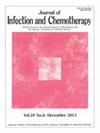Nationwide surveillance of antibacterial susceptibility in bacterial respiratory pathogens in Japan, 2022–2023
IF 1.5
4区 医学
Q3 INFECTIOUS DISEASES
引用次数: 0
Abstract
The emergence and spread of antimicrobial resistant (AMR) have become a major global concern. This nationwide surveillance study, conducted by the Japanese Society of Chemotherapy, Japanese Association for Infectious Diseases, and Japanese Society for Clinical Microbiology from 2022 to 2023, examined the antimicrobial susceptibility of respiratory pathogens. A total of 1057 bacterial isolates from 28 medical institutions, predominantly tertiary medical centers, were analyzed. Major pathogens included Staphylococcus aureus, Streptococcus pneumoniae, Haemophilus influenzae, Moraxella catarrhalis, Klebsiella pneumoniae, and Pseudomonas aeruginosa. Findings revealed increasing resistance rates, with a notable rise in extended-spectrum β-lactamase (ESBL)-producing K. pneumoniae. Susceptibility to penicillin, cephalosporins, and carbapenems varied, with specific declines observed in several antibiotics relative to prior surveillance data. No metallo-β-lactamase (MBL)-producing P. aeruginosa strains were detected. These findings underscore the need for rigorous antimicrobial stewardship and continuous surveillance to curb the spread of resistant pathogens in Japan.
日本2022-2023年细菌性呼吸道病原菌药敏监测
抗微生物药物耐药性(AMR)细菌的出现和传播已成为全球关注的主要问题。这项由日本化疗学会、日本传染病学会和日本临床微生物学会从2022年到2023年进行的全国性监测研究,检查了呼吸道病原体的抗菌药物敏感性。对28家医疗机构(以三级医疗中心为主)分离的1057株细菌进行了分析。主要病原体包括金黄色葡萄球菌、肺炎链球菌、流感嗜血杆菌、卡他莫拉菌、肺炎克雷伯菌和铜绿假单胞菌。结果显示耐药率上升,产生广谱β-内酰胺酶(ESBL)的肺炎克雷伯菌显著上升。对青霉素、头孢菌素和碳青霉烯类药物的敏感性各不相同,与先前的监测数据相比,观察到几种抗生素的特异性下降。未检出产生金属β-内酰胺酶(MBL)的铜绿假单胞菌。这些发现强调需要严格的抗菌素管理和持续监测,以遏制耐药病原体在日本的传播。
本文章由计算机程序翻译,如有差异,请以英文原文为准。
求助全文
约1分钟内获得全文
求助全文
来源期刊

Journal of Infection and Chemotherapy
INFECTIOUS DISEASES-PHARMACOLOGY & PHARMACY
CiteScore
4.10
自引率
4.50%
发文量
303
审稿时长
47 days
期刊介绍:
The Journal of Infection and Chemotherapy (JIC) — official journal of the Japanese Society of Chemotherapy and The Japanese Association for Infectious Diseases — welcomes original papers, laboratory or clinical, as well as case reports, notes, committee reports, surveillance and guidelines from all parts of the world on all aspects of chemotherapy, covering the pathogenesis, diagnosis, treatment, and control of infection, including treatment with anticancer drugs. Experimental studies on animal models and pharmacokinetics, and reports on epidemiology and clinical trials are particularly welcome.
 求助内容:
求助内容: 应助结果提醒方式:
应助结果提醒方式:


